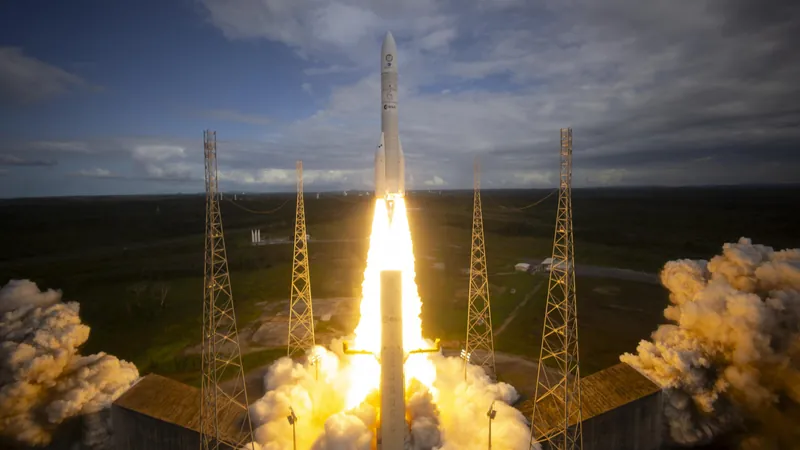
Trump's Energy Policy: A Complex Shift from "Drill, Baby, Drill" to a New Era
2024-12-21
Author: Liam
Introduction
As President-elect Donald Trump embarks on his new term, the once-simplistic rallying cry of "Drill, baby, drill" is set to evolve into a more nuanced energy policy shaped by a changing landscape and diverse influences. His cabinet selections underscore a commitment to the fossil fuel industry, yet hint at an intricate interplay with renewable energy initiatives.
Cabinet Appointments and Their Implications
Trump’s appointees reflect his intention to bolster oil production; for instance, North Dakota Governor Doug Burgum, appointed as Secretary of the Interior, is known for overseeing a significant oil boom in the state. His partner in this endeavor, Chris Wright—a natural gas CEO—is staunch in his support for fossil fuels yet has experience in clean energy initiatives, complicating the narrative surrounding Trump's agenda.
The Rise of Wind Energy
Wind energy, notably, has seen impressive gains under Burgum's governance, doubling its production from 2015 to 2023 and becoming North Dakota’s second-largest source of electricity. This dovetailing of fossil fuels and renewables demonstrates the complexities facing Trump’s energy policy.
Influence of Tech Industry
Adding another layer to this dynamic is tech mogul Elon Musk, who, despite his reservations about conventional fossil fuel reliance, holds considerable sway as a close advisor. Musk's presence signals a potential reconciliation between fossil fuel ambitions and the burgeoning electric vehicle market, especially as more tech companies commit to utilizing zero-carbon nuclear power.
Challenges Ahead
Despite Trump's promises to unleash domestic oil production, it's essential to recognize that U.S. oil output has already reached unprecedented heights under President Biden, suggesting that overturning these gains will not be straightforward. Additionally, Biden’s clean energy tax credits have stimulated the economy, particularly in Republican-led states, creating a challenging political landscape for Trump’s team.
Rollback of Biden's Climate Legacy
In anticipation of opening the oil floodgates, Trump plans to roll back significant segments of Biden’s climate legacy, including rejoining his efforts to withdraw from the Paris Agreement and limiting drilling restrictions on public land. Furthermore, the incoming administration is poised to encourage fossil fuel demand through deregulations that support gas-powered vehicles, alongside rapid approval of liquefied natural gas (LNG) export permits to meet international demand—especially in Europe and emerging markets in Asia.
Cautious Optimism in the LNG Sector
However, the LNG sector advises caution, aiming for durable legal processes to ensure that any new permits withstand potential court challenges.
Impact on Clean Energy
One of the most contentious elements of the new energy policy will revolve around clean energy. With many Republican districts benefiting from Biden's clean energy initiatives, an overzealous attempt to repeal them could lead to significant economic repercussions, risking both private investment and job losses. Additionally, while Biden's administration has fostered numerous clean energy projects—including offshore wind developments—the future of such initiatives hangs in the balance under Trump’s leadership.
Nuclear Energy Considerations
The nuclear industry, often a bipartisan favorite, may receive renewed attention amidst talk of a transition. With big tech companies increasingly investing in nuclear energy—a sector which has received substantial support from Biden's administration—there remains a significant question regarding how Trump's policy will impact funding and support for this zero-carbon resource.
Conclusion
As the energy policy landscape continues to evolve, the complexities surrounding fossil fuels, clean energy, and technological advancements make it clear that Trump's approach to energy will not be the same as in his previous term. Notably, experts like Neil Chatterjee have emphasized that the old divide between Republican fossil fuel support and Democratic clean energy advocacy is blurring, suggesting a new chapter in American energy policy. In summary, while the initial intentions of Trump’s energy agenda seem rooted in fossil fuel expansion, the interplay with renewables, especially given the contemporary focus on carbon neutrality and technological advancements, paints a picture of a much more layered energy policy for the United States moving forward.









 Brasil (PT)
Brasil (PT)
 Canada (EN)
Canada (EN)
 Chile (ES)
Chile (ES)
 España (ES)
España (ES)
 France (FR)
France (FR)
 Hong Kong (EN)
Hong Kong (EN)
 Italia (IT)
Italia (IT)
 日本 (JA)
日本 (JA)
 Magyarország (HU)
Magyarország (HU)
 Norge (NO)
Norge (NO)
 Polska (PL)
Polska (PL)
 Schweiz (DE)
Schweiz (DE)
 Singapore (EN)
Singapore (EN)
 Sverige (SV)
Sverige (SV)
 Suomi (FI)
Suomi (FI)
 Türkiye (TR)
Türkiye (TR)